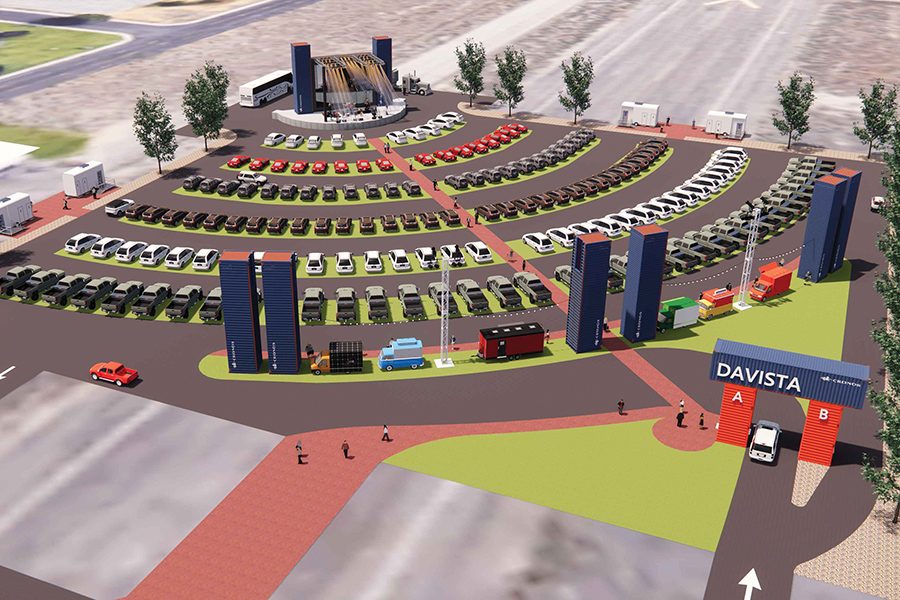
Home » Necessity is the mother of invention for Tri-Cities innovators
Necessity is the mother of invention for Tri-Cities innovators

July 15, 2020
Great disruptions can bring great opportunities.
For Derrick Stricker, a Tri-City commercial real estate broker, working during the Great Recession in Chicago drove that idea home.
Now, a decade older and working in the Mid-Columbia, he’s one of the many local entrepreneurs who see new opportunity in the Covid-19 pandemic.
Or rather, an old one.
Stricker organized a team to create DaVista Drive-In Theater and Event Center, a social distancing-friendly concept that could be installed at the former Vista Field municipal airport east of Columbia Center in the heart of Kennewick.
“It came to fruition on my white board in my war room,” he said, referring to his home office.
Stricker’s drive-in is just one of many new businesses emerging from the Covid-19 chaos.
Goose Ridge Winery is making sanitizer through its grape-based vodka distillery. A Richland logo business is distributing face masks. A small restaurant chain launched its own delivery service to compete with out-of-state apps.
It’s welcome news, said Karl Dye, president of the Tri-City Development Council, the region’s economic development agency. Placemaking supports development and makes the Tri-Cities attractive to talent.
“We need the amenity-based community,” he said.
The Port of Kennewick, which owns the airfield, turned down Stricker’s request to discuss a possible lease arrangement with staff in June. It said it wants to follow its plan to ask for proposals and select the best for Vista Field, its marquee development project.
Stricker is undaunted. He plans to press ahead with a possible Vista site and to consider others if he can find a central location with enough acres and asphalt.
“To me it’s not dead. It’s ‘no’ for now but it might be ‘yes,’ ” he said.
Covid-19 has revived interest in drive-in theaters across the country, breathing new life into old properties. Walmart announced it would set up drive-in movie theaters in 160 Walmart Supercenter parking lots between August and October.
Stricker said there’s a market in the Tri-Cities.
He served on the Vista Field Vision Committee that spelled out the urban mixed-use plan for the airfield. A drive-in was proposed then. It was proposed again as part of MyTri2030, a Tri-City Regional Chamber of Commerce visioning process.
Stricker serves as past president on the chamber’s executive committee.
“Right now, it’s scary launching a new business,” he said. “But it could be a very big win without committing a lot of capital.”
Benton and Franklin counties received some Covid-19 relief when they moved to a modified version of Phase 1 in early July under Washington’s Safe Start program. The move allowed some business activity to resume with safety standards in place.
The two counties continue to have some of the highest infection rates in the state and region.
The move away from the most limited phase was welcome relief to the restaurant and hospitality sectors. Business plummeted in March when Gov. Jay Inslee issued the Stay Home, Stay Healthy order, sidelining businesses called “nonessential.”
The stay-home order drove Tracy LaMarr to rethink how she and husband Steve run their two Chicken Shack restaurants — one in West Richland and another in Pasco.
The couple also own a homebuilding business.
Tracy was unhappy with the third-party delivery services that ferry orders to customers’ homes even before the pandemic hit.
“Often the poor service isn’t by us. Drivers got the wrong order or forgot the sauce. All that reflects on us. It’s Chicken Shack that forgot the sauce. It’s Chicken Shack that gets the bad reviews the next day,” she said.
When Chicken Shack lost its dining room business in March, she realized that third-party services and their 30 percent fees were a nonstarter. The Chicken Shacks wouldn’t survive the financial hit. Covid-19 gave her an incentive to reinvent the delivery model.
The LaMarrs stood up their own delivery service, complete with website and drivers personally trained by Tracy.
The LaMarrs started Tri-Cities Food Dudes — TCFoodDudes.com — to support Chicken Shack. But other desperate restaurant owners heard about it and wanted in.
Now it delivers for 20 area restaurants and is adding more all the time. LaMarr, who leaned heavily on her homebuilding expertise, is coaching restaurants on the art of Facebook and online ordering.
“We’re totally in control of the service,” she said.
She expects to keep the ordering service, which has 14 employees, going after the pandemic passes. Ordering online and through the app isn’t going to fade with the memories of the stay-home order.
“I think it’s a necessary thing,” she said. “TCFoodDudes keeps the money here, local, instead of the third parties coming from out of the community. The money stays here.”
The pandemic has forced others to face questions about the future.
Fuse Fund, a new Richland-based investment fund based in The Parkway business incubator that shares its name, was on the verge of investing in its first two companies when the pandemic struck, said Marty Conger.
Conger retired as chief financial officer of the Pacific Northwest National Laboratory and leads the Fuse Fund board, which launched earlier this year to invest in local start-ups.
The fund’s investment committee asked its two targets — a nutrition company and a blockchain-based credit card processor — to refine their plans to reflect the changing business conditions.
“We put them through a ringer. But we think they have pivoted and have a pathway to success,” he said. Fuse Fund is moving ahead with both investments.
Fuse is encouraging businesses to think like entrepreneurs.
“If you’re just waiting for the world to return to normal, that’s a pathway to go out of existence,” he said.
Local News
KEYWORDS july 2020





